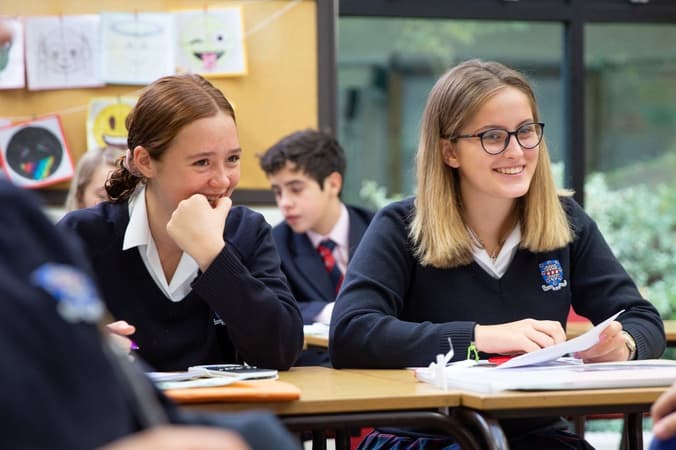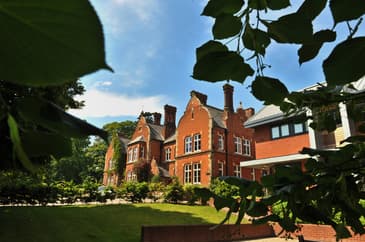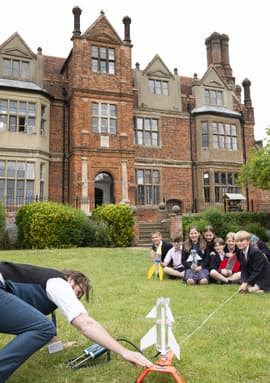
The benefits of engineering
With STEM subjects (science, technology, engineering and mathematics) being championed by the Department for Education, most schools are fulfilling their statutory requirements by supplementing their regular lessons with extra-curricular activities or the occasional STEM day from an external provider. At Woodbridge School Prep, unlike many other schools, we recognise that engineering is at the core of STEM, as it utilises science and maths to create technology and in 2017 took the decision to become one of the first schools in the UK to champion engineering as a stand-alone, timetabled subject.
“Scientists investigate that which already is.
Engineers create that which has never been.”
Albert Einstein
The introduction of engineering to the school curriculum was made with the hope that young girls and boys would foster the ability to use the knowledge and skills they have been taught and turn them to practical use.
With a recognised shortage of engineers Europe-wide and government findings that females are underrepresented in most STEM subject areas in the UK workplace, it is our responsibility as educators to promote inclusivity and prepare our children to fill the skills gap.
Some benefits of studying engineering are more obvious, such as developing useful tool skills, practical health and safety, assessing risk, constructive collaboration and seeing a plan come to completion; but it is no exaggeration that it will be up to the engineers of the future to imagine the designs that benefit humanity or confront environmental issues with real and concrete solutions. Put simply, engineering is important.

Engineering for Prep children
If you have a problem, you can always engineer a solution
When designing our bespoke curriculum, it was clear that the aim was to challenge and excite our students whilst developing their innovation, creativity, analytical and team skills. It will be these attributes that set them apart from others and contribute to their future success in secondary education, further education and beyond. If engineering can foster this kind of attitude in our students, they will undoubtedly become resilient adults.
“I have not failed;
I’ve just found ten thousand ways that didn’t work.”
Thomas Edison
This is why each project is designed to create safe situations in which our students can fail as well as succeed. They are not given a set of instructions or step-by-step guidance – each child’s project will be unique, it will have evolved and adapted as failure is met and solutions are found.
“Engineers and the environment –
natural allies in our fight…”
John Curtin, Environmental Agency
It is also important that our students develop a wider social conscience and consider the failure of humanity to look after our planet. The environment permeates throughout every module: the consequences of our material choices, offsetting our carbon impact, waste management and the financial implications of our constructions are discussed implicitly in lessons.
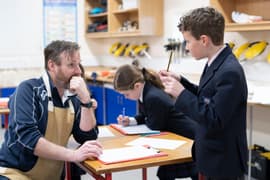
Design of our engineering curriculum
The subject is taught to all students from Year 1 through to Year 6 with an optimal class size of ten, which has obvious advantages. All lessons are delivered by a specialist engineering teacher, who has a degree in business and engineering, experience as a project engineer in a multinational manufacturing company and holds the necessary qualifications to deliver the subject safely and expertly.
Woodbridge School Prep is proud to have designed the engineering curriculum from the ground up and, at its foundations, it attempts to cover several branches of engineering, ensuring students are exposed to as rich a variety of applications and skills as possible, including:
- Mechanical engineering
- Electrical engineering
- Chemical/materials engineering
- Robotics engineering
- Civil/structural engineering
- Aeronautical engineering
- Energy/environmental engineering
- Marine engineering
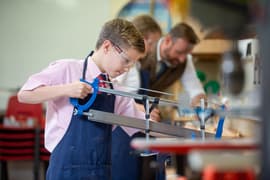
Delivery of our engineering curriculum
Students will study three of these branches, one per term, and start each unit with an academic lesson on the scientific principles that they will need to employ, including (but not limited to):
- Newton’s laws of motion
- Newton’s laws of viscosity
- Universal law of gravitation
- Archimedes’ law of buoyancy
- Bernoulli’s principle
- Tension, torsion and compression
- Basic electrical theory
- Pascal’s Laws of fluid mechanics
Students work to complete an end of unit goal; a challenge or problem that must be solved, either as an individual or part of a group.
These goals have also been created to develop their studies into other subjects or respond to local or global issues. Following the School’s CLICK values, most modules encourage complete freedom of design, material selection and construction, rather than restricting pupils to instructions or kits. The students are facilitated, rather than instructed how, to reach an outcome; therefore, producing real engineers. Using this approach enables students to learn about the environmental and financial impact of their choices.
Finally, all projects culminate in a testing and evaluation process. This may consist of taking simple measurements, a competition against each other or stress testing (in some cases destructive testing which is why many of their projects don’t make their way home to parents!). This allows failure points to be identified and valuable analysis of their project to be conducted.
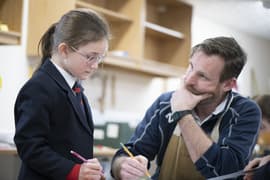
Meet the staff
Chris Smith (Head of Engineering)
Chris Smith is a passionate and specialist teacher of Engineering. He holds a degree incorporating Engineering with Business and worked as a project engineer for a major European manufacturer before attaining his PGCE to become a teacher.
Apart from a brief sabbatical teaching in Malaysia, Chris has taught at Woodbridge school since 2002 and introduced Engineering as a curriculum subject in 2016.
Want to see for yourself?
In addition to our open days, we welcome visits from parents and children looking for the right foundation for life ahead. We’ll be happy to show you around and answer any questions you have about our School, staff and the support we offer our students.

